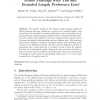Free Online Productivity Tools
i2Speak
i2Symbol
i2OCR
iTex2Img
iWeb2Print
iWeb2Shot
i2Type
iPdf2Split
iPdf2Merge
i2Bopomofo
i2Arabic
i2Style
i2Image
i2PDF
iLatex2Rtf
Sci2ools
ACID
2006
2006
Stable Marriage with Ties and Bounded Length Preference Lists
We consider variants of the classical stable marriage problem in which preference lists may contain ties, and may be of bounded length. Such restrictions arise naturally in practical applications, such as centralised matching schemes that assign graduating medical students to their first hospital posts. In such a setting, weak stability is the most common solution concept, and it is known that weakly stable matchings can have different sizes. This motivates the problem of finding a maximum cardinality weakly stable matching, which is known to be NP-hard in general. We show that this problem is solvable in polynomial time if each man's list is of length at most 2 (even for women's lists that are of unbounded length). However if each man's list is of length at most 3, we show that the problem becomes NP-hard (even if each women's list is of length at most 3) and not approximable within some > 1 (even if each woman's list is of length at most 4).
| Added | 30 Oct 2010 |
| Updated | 30 Oct 2010 |
| Type | Conference |
| Year | 2006 |
| Where | ACID |
| Authors | Robert W. Irving, David Manlove, Gregg O'Malley |
Comments (0)

